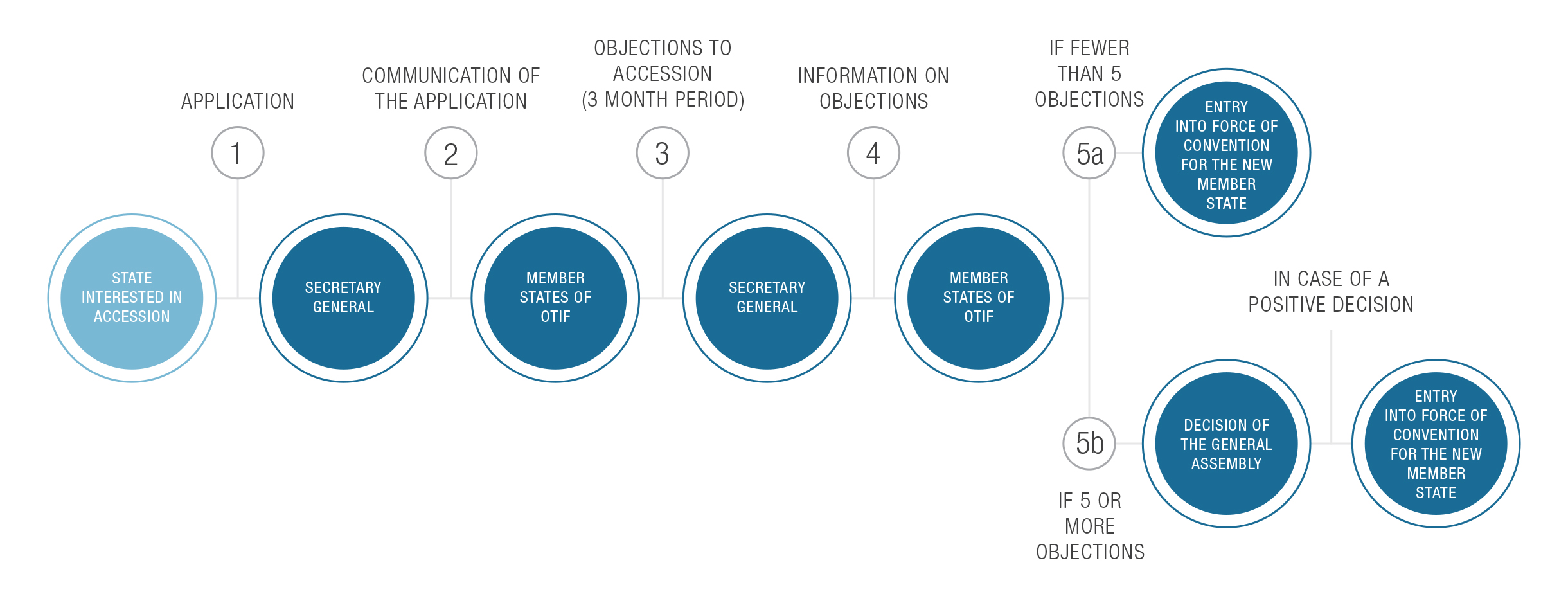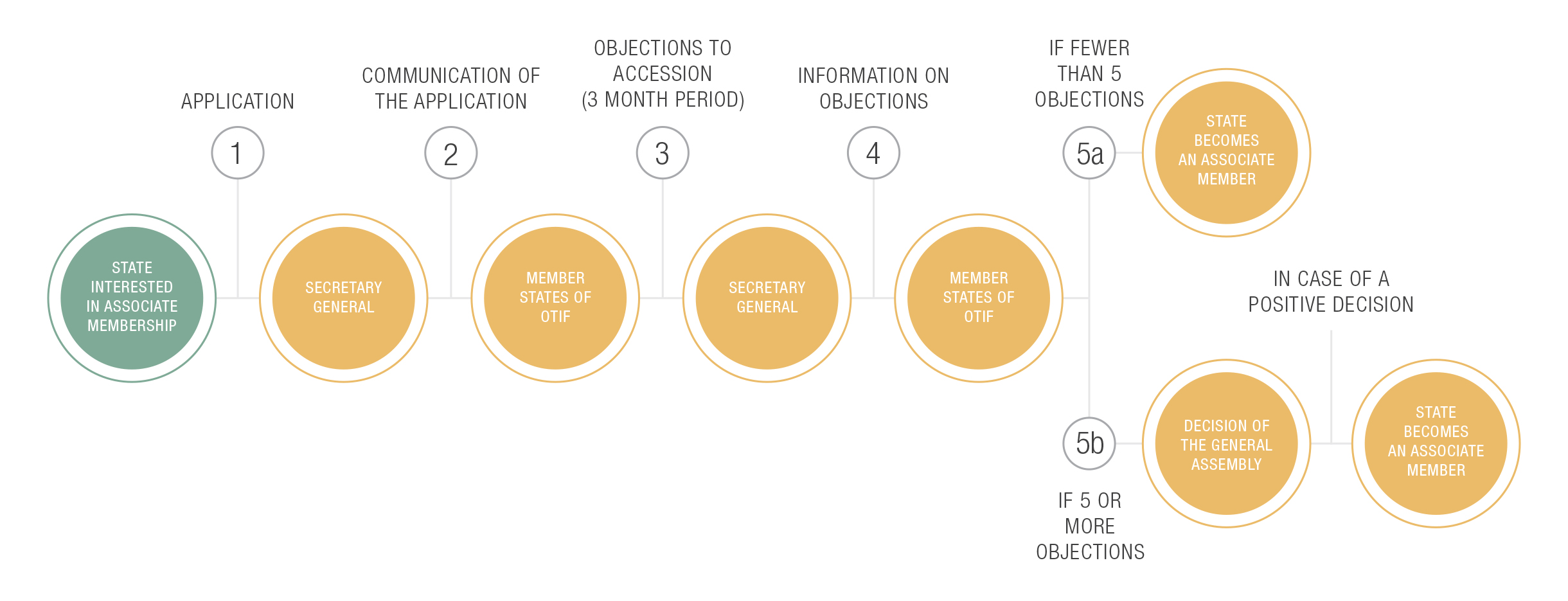Accession

The Convention concerning International Carriage by Rail (COTIF) is an international instrument providing uniform international railway law for states in Europe, Asia and Africa. The aim of the Organisation, as defined in COTIF Article 2, is to promote, improve and facilitate, in all respects, international traffic by rail. OTIF Member States represent different legal traditions and railway market organisation structures, both economically and technically.
In accordance with COTIF, there are three types of membership of OTIF:
A state becomes a member of OTIF by acceding to COTIF. In other words, a member is a contracting party to COTIF. In accordance with COTIF Article 37 any accession to COTIF may only relate to the Convention in its version in force at the time when the accession takes effect. COTIF Article 37 stipulates only one substantive condition for accession – railway infrastructure must be operated on the territory of the state concerned. However, the existence of a direct railway connection with the current Member States is not a condition for accession.
When it makes an application for accession to COTIF, any state which is a party to another convention concerning international through carriage of passengers and goods by rail comparable to the CIV UR (Appendix A) and CIM UR (Appendix B) may declare that it will apply CIV UR and/or CIM UR only to carriage performed on a part of the railway infrastructure (i.e. railway lines) situated on its territory. This part of the railway infrastructure must be precisely defined and connected to the railway infrastructure of a Member State. The provision “connected to the railway infrastructure of a Member State” only covers connections to the infrastructure of a Member States on which CIV UR or CIM UR apply. However, it is also possible to connect part of an overland railway infrastructure with another Member State’s infrastructure through maritime lines (CIV UR Article 1 § 3 and CIM UR Article 1 § 4). At a later stage, Member States may include new railway lines or delete them by sending the Depositary (Secretary General) notification concerning the inclusion or deletion of such part of the railway infrastructure.
One of the most important rights of the Member States is the right to participate in the creation and development of international law concerning cross-border rail transport within the organs of OTIF. At the time of accession, a state has to decide which parts of COTIF uniform law (i.e. which appendices) it will apply.
Accession procedure
The formal procedure for accession consists of two stages: national, as defined by national law, followed by international, as defined by COTIF. The international procedure is described below.
(1) A state wishing to accede to COTIF shall address an application to the Depositary (Secretary General). Accession is an expression of a state’s consent to be legally bound by COTIF. An instrument of accession has to be signed by the Head of State, Head of Government or Minister of Foreign Affairs or other state authorities on condition that full powers are submitted. An instrument of accession may be accompanied by reservations and declarations not to apply certain provisions of the Convention itself or of its Appendices under conditions defined in COTIF. Detailed information on formal requirements applicable to an accession instrument and reservations, as well as model instruments, may be found in the Guidelines on treaty acts under COTIF.
(2) The Depositary (Secretary General) shall notify the application to the OTIF Member States.
(3) Member States of OTIF have a three-month period in which to lodge objections.
(4) After the expiry of that period the Depositary (Secretary General) notifies the applicant state and the Member States that the application has been accepted (fewer than 5 objections) or that the application will be submitted to the General Assembly for decision (5 or more objections).
(5a) In the event of no or fewer than five objections, the accession shall take effect on the first day of the third month following the notification by the Depositary of the acceptance of the application, or
(5b) In the event of opposition from at least five Member States, the application shall be accepted after a favourable decision by the General Assembly. The accession shall take effect on the first day of the third month following the notification by the Depositary of the acceptance of the application.

A regional economic integration organisation becomes a member of OTIF by acceding to the Convention. COTIF Article 38 stipulates two main conditions for an accession:
- such an organisation shall have competence to adopt its own legislation binding on its Member States, in respect of the matters covered by COTIF;
- one or more Member States of such organisation are members of OTIF.
The detailed conditions of accession for regional economic integration organisations must be defined in an agreement concluded between OTIF and the regional organisation. The conditions of accession for a regional economic integration organisation have to be approved by the General Assembly. The accession of regional economic integration organisations takes legal effect in accordance with the agreement concluded with OTIF.
A state interested in OTIF’s work that wishes to be involved, without having to assume all the rights and obligations that go with membership, may become an associate member. Such an associate member is not a contracting party to COTIF. Participation, in the form of association, is intended to facilitate subsequent full accession.
Article 39 only stipulates one substantive condition in order to become an associate member – operation of railway infrastructure on the territory of the state concerned.
Accession procedure
(1) A State wishing to become an associate member of OTIF shall address an application to the Depositary (Secretary General). Acts for the purpose of becoming an associate member may be executed by the Head of State, Head of Government or Minister of Foreign Affairs or other competent state authorities without the submission of full powers (e.g. minister responsible for transport etc.). Detailed information on formal requirements applicable to the application for associate membership, as well as a model instrument, may be found in the Guidelines on treaty acts under COTIF.
(2) The Depositary (Secretary General) shall notify the application to the Member States.
(3) Member States of OTIF have a three-month period in which to lodge objections.
(4) After the expiry of that period the Depositary (Secretary General) notifies the applicant state and the Member States that the application has been accepted as legally binding (fewer than 5 objections) or that the application will be submitted to the General Assembly for decision (5 or more objections).
(5a) In the event of no or fewer than five objections, the application is deemed to be accepted three months after Depositary has notified the Member States of the application.
(5b) In the event of opposition from at least five Member States, the application is accepted after a favourable decision by the General Assembly. The depositary shall notify the decision.

